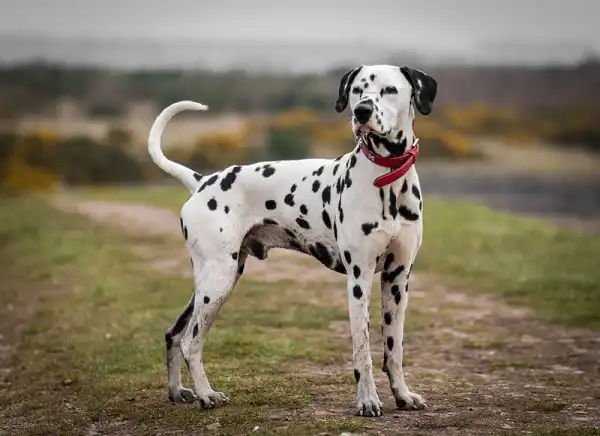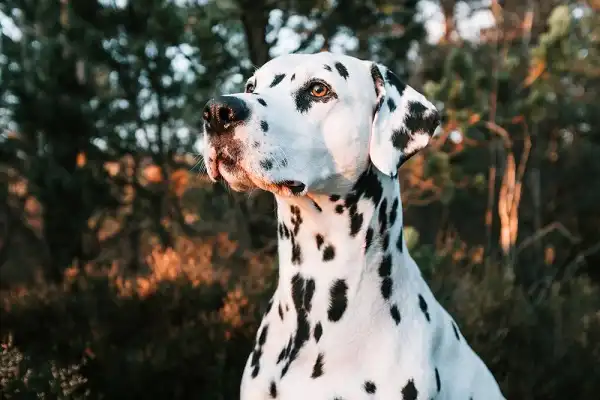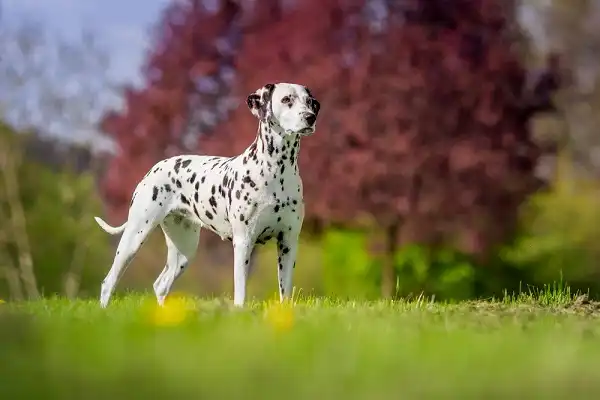As one of the most popular dog breeds, Dalmatians are known for their spots and friendly personality. Though they may seem like a recent addition to the canine world, they have actually been around for centuries. If you’re considering adding a Dalmatian to your family, read on to learn more about this fascinating breed.

Dalmatian Description
Dalmatians are medium-sized dogs with powerful, muscular bodies. Their short, stiff coat is traditionally white with black or brown spots. The spots can vary in size, shape, and color, though they are usually evenly distributed over the body. Though Dalmatians were originally bred as a hunting dogs, their most recognizable trait is also their most iconic – their spotted coats! Dalmatians are known to be extremely intelligent and active, making them excellent family companions. They are very loyal and form strong bonds with their owners. They require plenty of physical activity and mental stimulation to thrive in a home environment. Dalmatians love belly rubs, playing fetch, and learning new tricks! They make a great jogging or running partners; however, due to their strong prey drive, they must always be kept on a leash when outdoors.
Dalmatian Habitat
Dalmatians are not a particularly picky breed when it comes to their habitat, as long as their physical and mental needs are met. They do best in homes with plenty of outdoor space for them to run and explore, but can also adjust to living in apartments if provided with regular walks or trips to the dog park. These dogs tend to do better in climates that aren’t too extreme and with access to temperatures between 65-85 degrees Fahrenheit. They also require plenty of shade and water during hot summer days. A securely fenced yard is ideal for allowing your Dalmatian room to roam and get their daily exercise. Dalmatians should be kept indoors, however, they love having their own special area outdoors like a kennel or a designated “dog house” where they can relax away from the hustle and bustle of your home on nice days.
While it is possible for them to live outside all year round, it is not ideal for their health as they prefer the comfort of being indoors when temperatures drop below freezing. When choosing a home for your Dalmatian, make sure you provide them with plenty of toys, beds, blankets, and chew toys so they have something to occupy themselves throughout the day. Keeping their environment clean by regularly vacuuming pet hair and washing bedding is important too! Additionally, owners must ensure that any hazardous materials or dangerous items are safely out of reach from their pups whenever possible.

Dalmatian Diet
Dalmatians have an appetite for quality food. They require a mixture of proteins, carbohydrates, and fats in their diet to provide them with the essential nutrients they need to stay healthy and active. Some recommended sources of protein include lean meats such as chicken, beef, fish, eggs, and legumes; while carbohydrates can come from fruits, vegetables, and whole-grain starches. Fats should come from sources like olive oil or coconut oil. When selecting a dog food brand for your Dalmatian it is important to find one that is specifically tailored to the breed’s needs. Look for foods labeled as being made for large breed dogs or active breeds. It is also important to choose a formula that has been developed to meet the nutritional requirements needed by growing puppies as well as adults in order to ensure maximum health benefits throughout your pup’s life.
In addition to a balanced dog food diet, providing your Dalmatian with healthy treats is also recommended. Treats are great not just as rewards during training sessions but can also help supplement their regular meals when needed in order to keep them feeling full between meals. Some examples of healthy treats include carrots, apples, frozen green beans, or peas – all of which contain essential vitamins and minerals! It is important not to overfeed your Dalmatian either – too much food can lead to weight gain which can cause joint discomfort and further health problems down the line.
Dalmatian Size
Dalmatians are considered a medium-sized breed of dog, with adults reaching heights between 20 to 24 inches at the shoulder and weighing between 45 to 70 pounds. Due to their great size and sturdy structure, Dalmatians make excellent guard dogs, as they have an innate ability to sense danger and protect their family in times of need. With proper socialization, these pups can also make wonderful family pets as they are known for being very loyal and affectionate towards their owners. When it comes to exercise needs, Dalmatians require daily physical activity in order to stay fit, healthy, and happy. Their energetic nature should be taken into consideration when selecting the right amount of exercise for them each day.
Dalmatian Lifespan
Dalmatians generally have a lifespan of around 10 to 14 years when properly cared for and given the right nutrition. While no two dogs are the same, they typically age at an average rate of one human year equal to seven dog years. This means that a five-year-old Dalmatian is roughly equivalent to a 35-year-old human. It’s important to note that overall health and environment can also play a role in how long your pup may live. Proper exercise, diet, socialization, and regular vet checkups are essential when it comes to ensuring your Dalmatian’s longevity. Exercise should consist of daily activities such as long walks or jogs on a leash as well as playing fetch with their favorite toy or ball.
The diet should include high-quality food that is rich in protein but low in fat, avoiding foods that are too high in carbohydrates whenever possible. Socializing them regularly with other friendly animals or people can help keep them feeling stimulated and prevent boredom from setting in over time. On average, female Dalmatians tend to live 1 – 2 years longer than males in most cases, although this isn’t always the case depending on lifestyle and breeding habits. It’s also worth noting that while they may be considered senior citizens after ten years old, these pups are still full of energy and love! With proper care and attention throughout their lives, you’ll be able to enjoy many happy memories with your furry friend for many years!

Dalmatian Behavior
Dalmatians are known for being very loyal and affectionate, with a friendly nature that makes them great family pets. They are also intelligent and easy to train, provided they get plenty of patience, consistency, and positive reinforcement during the process. As guard dogs, their natural sense of danger will lead them to protect their family when needed. Dalmatians require a lot of love, exercise, and attention in order to stay physically and mentally healthy. Daily physical activities such as walks or jogging on a leash are important for this breed in order to maintain a healthy weight and overall well-being. In addition, playing games like fetch or tug-of-war can help keep your pup entertained while providing them with important mental stimulation.
Socialization is also an important factor when it comes to raising a well-rounded Dalmatian puppy – introducing them early on to new people, places and experiences can help prevent any potential issues from developing down the line. Overall, when properly cared for, Dalmatians make wonderful family pets due to their loyalty and unique personalities! Providing plenty of physical activity along with proper nutrition will ensure that these pups remain happy and healthy for years down the road! With careful planning and monitoring from you as well as regular vet checkups, you can rest assured that your furry friend is getting everything they need for a lifetime of joy!
Dalmatian Speed
Dalmatians have a reputation for being one of the fastest breeds of dogs, thanks to their muscular legs and long stride. They are capable of achieving impressive speeds in short bursts, with some reports indicating they can reach up to 30 mph (48 km/h) when running flat out. Additionally, Dalmatians have the stamina for long-distance running and can keep a steady pace of 18-20 mph (29-32 km/h) for several miles at a time. The Dalmatian’s speed is partly due to its ancestry; the breed was originally developed as a carriage dog in Croatia and is thought to be related to other high-speed hunting hounds like Greyhounds and Whippets.
Its strength, agility, and athleticism make it ideal for agility courses, coursing events, and outdoor activities such as jogging or hiking. However, it’s important to note that while Dalmatians are naturally fast, they need proper training and conditioning in order to maximize their potential speed. As with any active breed, these pups should receive regular exercise such as daily walks or runs on a leash in order to stay fit and healthy. A balanced diet containing high-quality protein is also essential for supporting muscle growth while avoiding obesity
Dalmatian Hunting
Dalmatians have a long history of being used for hunting purposes. Historically, these dogs were used to hunt gamebirds and small game animals such as rabbits and hares. They have an excellent sense of smell and keen eyesight which makes them ideal hunting companions. Modern-day Dalmatians are still utilized in some areas for hunting purposes. In particular, they are popular among duck hunters who rely on the dog’s ability to locate birds quickly and retrieve them with ease. Additionally, their distinctive coats make them excellent swimmers, allowing them to traverse even icy waters in search of prey.
Although Dalmatians require training and conditioning to be effective hunters, they are incredibly intelligent and eager to please which makes them relatively easy to train. Furthermore, they are particularly adept at tracking scents which makes them useful in both finding and flushing out quarry – two essential components of successful hunts! Overall, Dalmatians make loyal and devoted companions not just at home but also in the field – perfect for all types of hunting excursions!

Conclusion
Dalmatians are an intelligent, active, and athletic breed of dog that has been around for centuries. They were originally bred as carriage dogs and are known to be incredibly fast runners in addition to having excellent hunting capabilities. Although they require dedicated training and proper conditioning in order to reach peak performance levels, these powerful pups possess the strength, agility, and athleticism necessary for success in a variety of activities such as coursing events, agility courses or even hunting trips with their owners. With the right care and attention, Dalmatians can make loyal companions both at home and on outdoor adventures!
Frequently Asked Question


